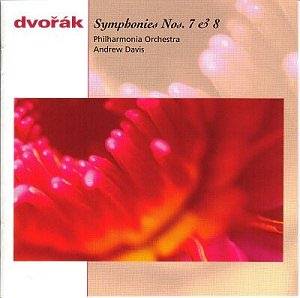How times change. The first CD I ever bought of a Dvorák symphony was the Dohnanyi version of the Seventh on Decca, 40 minutes worth on one full price disc. Now, at bargain price, one can get the Seventh and Eighth together in quite a few first-rate performances. This particular one is 70s analogue sound, though very good, and features Andrew Davis quite early on in his recording career. It is reliable rather than inspired, and boasts some good playing from the Philharmonia, who always seemed to play well for Davis. The real problem is the competition, which boasts some classic accounts of the same coupling at budget and mid-price. These include Colin Davis and the Concertgebouw on Philips, Antal Dorati and the LSO on Mercury, the above-mentioned Dohnanyi with the Cleveland Orchestra, and probably finest of all, Kubelik and the Berlin Philharmonic on DG. In addition, one can find even better value two-for-one sets which give the collector the last three symphonies and useful fillers, such as the Symphonic Variations or some of the tone poems. So this Sony disc is entering one of the most competitive areas of the market, and though it is one of the cheapest, it is only partially successful.
To start with the down side, the greater symphony of the two, the Seventh (possibly Dvorák’s finest single score), lacks the sort of drama, flair and rhythmic drive that many of the others are able to bring to this wonderful piece. The very opening lacks mystery, and Davis seems content to settle for unity and cohesion (worthy though they are) rather than the sort of Slavonic bite we get from, say, Kubelik. The great slow movement, with its Wagnerian overtones, is warmly done, with fine horn solos. The scherzo is a shade under characterised for my liking, with a rather plodding tempo, and none of the lightness and grace that Colin Davis is able to bring with his superb Dutch band. The finale comes off well, though again Andrew Davis seems to favour lyricism over rhythmic bite and propulsion, the consequence being a slight drop in tension. There are many things to enjoy, but it can’t compare to the best.
The emphasis on lightness and lyrical outpouring pays far greater dividends in the warm-hearted Eighth. This is an altogether more spontaneous performance, and the Philharmonia do him proud. Davis makes far more of the contrast within the piece, from the mellow, lilting first movement opening, to the grittier development section and dramatic close of the movement. The Adagio is expressively done, the strings in particular sounding full bodied and rich. There is a vibrancy and freshness in the scherzo that is missing from the Seventh’s corresponding movement, possibly because of Davis’s response to the lyrical content. The finale is thrilling, and though the brass may be a little raucous, they clearly enjoy themselves.
Notes are concise but helpful, and the EMI recording is excellent. Anyone purchasing on the off chance probably won’t be too disappointed, but anyone who seriously wants to investigate Dvorák should sample the competition first.
Tony Haywood


